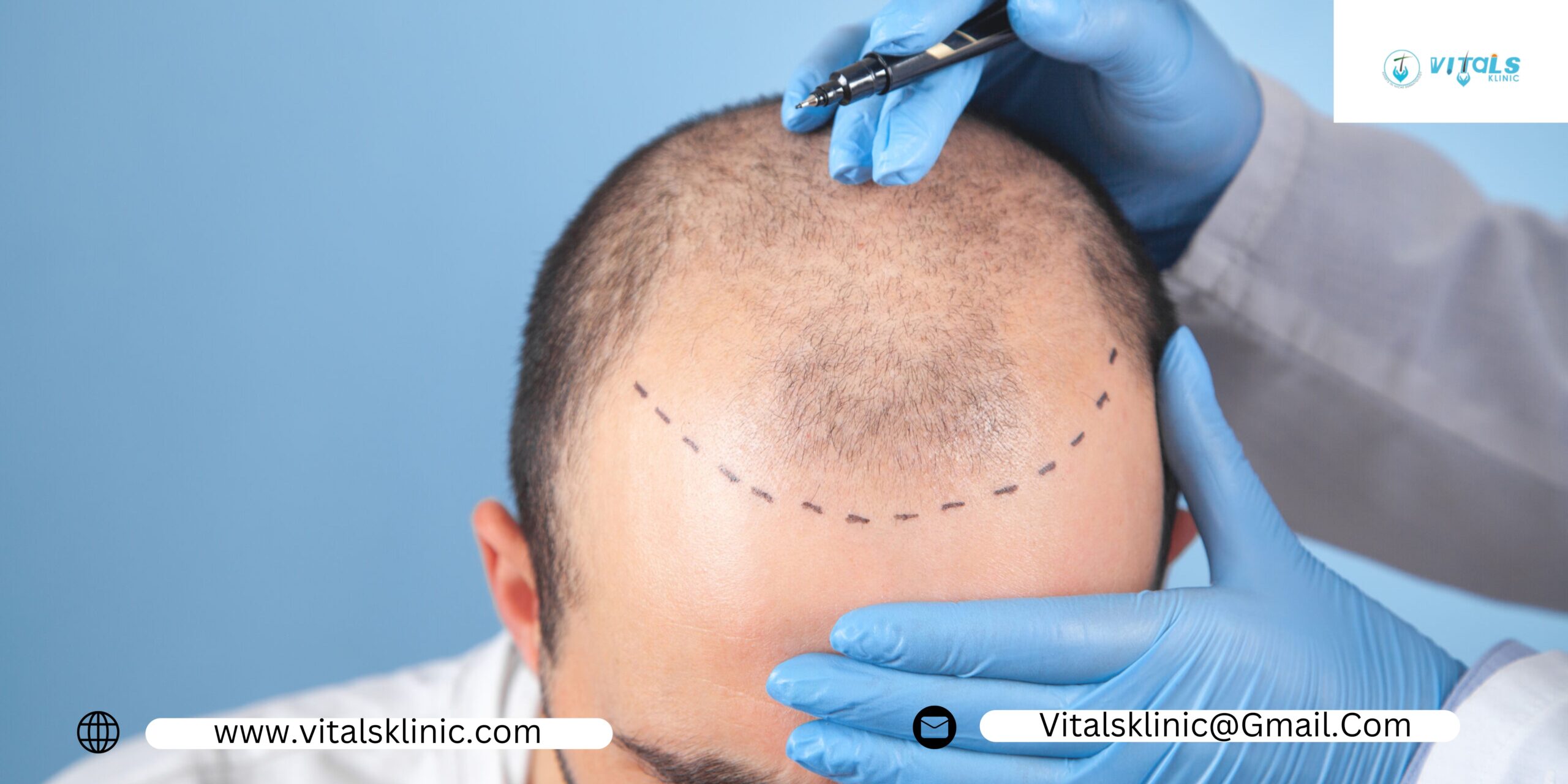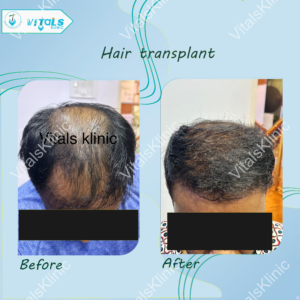
PRP vs Hair Transplant: Which Is Better for You?
PRP vs Hair Transplant: Differences, Benefits, and Best Option for You Hair loss is a concern that affects both men and
Date :13-Sep-2023

Are you tired of dealing with hair thinning or bald patches? If you’ve been searching for the best hair transplant in Bangalore, you’re in the right place. Hair loss can be caused by stress, genetics, or hormonal imbalance — but modern medical advancements now make it possible to restore your natural hair and confidence.
Bangalore has become one of India’s top destinations for advanced hair restoration treatments. With world-class dermatologists, state-of-the-art clinics, and innovative techniques, this city offers everything you need for safe and effective hair transplantation. Among the top names, Vitalsklinic has earned a trusted reputation for its transparent approach, expert surgeons, and life-changing results.
Hair loss, medically known as alopecia, is one of the most common concerns affecting both men and women. While losing 50 to 100 strands of hair daily is considered normal, excessive or sudden hair fall can indicate an underlying issue. Understanding the main causes of hair loss can help you take preventive measures and choose the right treatment options.
One of the most common causes of hair loss is heredity, also known as androgenetic alopecia or pattern baldness.
In men, this often appears as a receding hairline or bald patches on the crown.
In women, it usually causes thinning of hair across the scalp rather than total baldness.
This condition is genetic and linked to hormones called androgens, which affect hair growth cycles. While it cannot be completely prevented, early treatment and lifestyle management can slow down the progression.
Hormones play a major role in maintaining healthy hair growth. Imbalances due to pregnancy, childbirth, menopause, thyroid issues, or conditions like polycystic ovarian syndrome (PCOS) can lead to significant hair loss.
In women, postpartum hair loss is common a few months after childbirth, whereas menopause can cause overall thinning due to reduced estrogen levels. Treating the underlying hormonal issue often helps in controlling the hair fall.
Excessive physical or emotional stress can trigger a temporary type of hair loss called telogen effluvium. During this condition, hair follicles enter a resting phase prematurely, leading to noticeable shedding.
Stress-related hair loss is reversible — once the stress is managed, normal hair growth usually resumes within a few months. Regular exercise, meditation, and adequate sleep can help reduce stress-induced hair fall.
Poor nutrition and vitamin deficiencies are major contributors to hair loss. Your hair needs essential nutrients to stay strong and healthy.
Common deficiencies include:
Iron – Low levels can cause anemia, reducing oxygen supply to hair follicles.
Vitamin D – Supports hair follicle health and regeneration.
Protein – Essential for keratin production, the main structural component of hair.
Zinc and Biotin – Help maintain hair strength and prevent breakage.
Eating a balanced diet rich in lean proteins, fruits, vegetables, and healthy fats can promote healthy hair growth.
Several medical conditions can affect hair growth:
Alopecia Areata: An autoimmune disorder where the body’s immune system attacks hair follicles, causing patchy bald spots.
Thyroid Disorders: Both hypothyroidism and hyperthyroidism can trigger hair thinning.
Scalp Infections: Fungal infections like ringworm can lead to hair loss in affected areas.
Chronic Illnesses: Conditions such as diabetes or lupus may also cause ongoing hair shedding.
If hair loss is sudden or patchy, consulting a dermatologist for diagnosis and treatment is crucial.
Certain medications can lead to temporary hair loss as a side effect. These include:
Chemotherapy and radiation for cancer treatment
Blood thinners (anticoagulants)
Antidepressants and beta-blockers
Hormonal treatments such as birth control pills
Once the medication is stopped, hair growth usually resumes. However, always consult your doctor before discontinuing any prescribed medicine.
Frequent use of harsh hair products, heat styling, or tight hairstyles can damage hair shafts and follicles, leading to traction alopecia.
Common damaging habits include:
Overuse of hair straighteners, curlers, and blow dryers
Chemical treatments like bleaching, perming, or coloring
Wearing tight ponytails or braids for long durations
Adopting gentle hair care routines and avoiding excessive styling can help prevent this type of hair loss.
As we age, the rate of hair growth slows down. Hair strands become finer, weaker, and lose pigment, leading to gradual thinning. This is a natural process, but maintaining a healthy scalp and following a proper diet can help slow it down.
Pollution, exposure to harmful UV rays, and hard water can damage hair follicles and cause breakage. These external factors weaken the scalp over time, making hair dry, dull, and prone to shedding. Using protective hairstyles and cleansing your scalp regularly can minimize environmental damage.
If you’re experiencing excessive hair fall, consult a qualified dermatologist or visit a reputable clinic like Vitalsklinic in Bangalore for a professional scalp evaluation and customized treatment plan.
Healthy hair starts with a healthy lifestyle — nourish your body, manage stress, and seek expert help when needed.
A hair transplant is a precise surgical procedure where healthy hair follicles are extracted from a donor area (usually the back or sides of the scalp) and implanted into bald or thinning regions. These transplanted follicles continue to grow permanently, resulting in thicker, fuller, and natural-looking hair.
FUT (Follicular Unit Transplantation):
In this traditional method, a strip of scalp is removed, and follicles are separated for implantation. It’s ideal for covering larger bald areas.
FUE (Follicular Unit Extraction):
A modern approach where individual follicles are removed and implanted one by one. This technique offers minimal scarring and faster recovery.
DHI (Direct Hair Implantation):
The most advanced method that uses a Choi implanter pen, allowing direct placement of follicles without prior incisions — ensuring high precision and density.
When it comes to achieving natural-looking, long-lasting results, Vitalsklinic stands out as one of the most reliable and result-driven hair transplant clinics in Bangalore.
With years of experience, advanced technologies, and a team of highly skilled dermatologists, Vitalsklinic has helped thousands of patients regain confidence through successful hair restoration.
Over 1000+ successful hair transplant cases.
Advanced FUE and DHI techniques ensuring high precision.
Affordable and transparent pricing — no hidden costs.
Dedicated post-procedure care and consistent follow-ups.
Perfect for those who prefer a quick recovery and minimal scarring.
Provides higher density and precision for a more natural look.
Ideal for men who want a fuller, well-defined facial appearance.
Customized treatments designed to enhance women’s beauty and address hormonal or genetic hair loss.
The average hair transplant cost in Bangalore depending on the chosen technique and the surgeon’s experience.
At Vitalsklinic, patients receive premium-quality treatment at affordable rates without compromising safety or results.
Number of grafts required
Technique used (FUE or DHI)
Surgeon’s expertise
Clinic location and facilities
Follow all medications and post-care instructions provided by your doctor.
Sleep with your head elevated for the first few nights.
Eat a balanced, protein-rich diet to support hair growth.
Avoid scratching or touching the transplanted area.
Skip heavy workouts and swimming for 2 weeks.
Avoid alcohol and smoking, as they can affect healing.
A hair transplant is suitable for:
Men and women with pattern baldness or receding hairlines.
Individuals with stable donor areas and good overall health.
Avoid surgery if:
You’re under 25 years old (still experiencing hormonal hair loss).
You have serious medical conditions that may affect recovery.
Myth: Hair transplants are painful.
Fact: Local anesthesia ensures a pain-free experience.
Myth: Results look artificial.
Fact: Expert surgeons at Vitalsklinic ensure natural-looking implantation angles.
Myth: Transplanted hair falls out again.
Fact: Once transplanted, hair follicles continue to grow permanently.
Permanent, natural hair regrowth
Improved self-image and confidence
Scientifically proven, safe techniques
Personalized treatment plans designed for every individual
If you’re looking to restore your hair and confidence, Vitalsklinic is your trusted partner for the best hair transplant in Bangalore. With expert care, advanced technology, and transparent pricing, Vitalsklinic makes your hair restoration journey safe, seamless, and successful.
Regrow your hair — and rediscover yourself with Vitalsklinic today!

PRP vs Hair Transplant: Differences, Benefits, and Best Option for You Hair loss is a concern that affects both men and

10 Essential Questions You Should Ask Before a Hair Transplant When considering a hair transplant, it’s natural to feel both excited

ACNE vs PURGING – Vital Differences You Must Know to Save Your Skin You just started a new skincare routine and